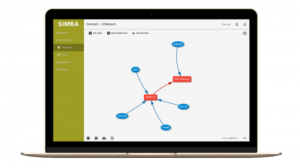

Commenting on the award, SIMBA Chain CEO Joel Neidig says demand for more robust data security systems is the direct result of the exponential volume of sensitive data exchanged via mobile devices. “The DoD, defense contractors, and enterprise-level businesses have benefited from mobile devices and how easy it has become to access and exchange date.
“However, the enhanced flow of information represents a significant security risk. Hence the need for sophisticated blockchain solutions that authenticate and document users, eliminate third party bad actors and otherwise allow secure direct connections between trusted sources. This is absolutely essential for the DOD, which is constantly handling data central to both the nation’s security and global leadership in science and technology.”
The challenge
The DoD accounts for nearly 40% of all federal research and development (R&D) appropriations. Through the Defense Technical Information Center, DoD manages and provides oversight for an estimated 4.5M documents for 4,000 users.
The project with SIMBA Chain – dubbed ALAMEDA (Authenticity Ledger for Auditable Military Enclaved Data Access) – will commence June 1, 2020, and run through Sept. 30, 2020. Phase I results will serve as a foundation for, if awarded, a $1M SBIR Phase II award. This will focus on a broader commercialisation strategy.
The goal of ALAMEDA is to create a single system for sharing R&D-related documents and scientific data sets by augmenting existing repositories through the application of Distributed Ledger Technologies (DLT) to maintain the authenticity and identification of the source for information. Project requirements include:
- defining access controls for documents and datasets
- ensuring integrity through validation mechanisms
- providing document delivery and access verifications
- enabling rapid searches
- establish a standardised path for data providers and repositories to integrate documents and data sets into the system.
SIMBA Chain and ALAMEDA
ALAMEDA will make it possible to share documents and scientific datasets in a manner that:
- protects integrity and authenticity
- provides a control layer for adding groups, users and permissions to documents they share.
DoD selected SIMBA Chain’s cloud-based Smart Contract as a Service (SCaaS) platform because it empowers users of all skillsets to:
- create and deploy decentralised applications (dApps) for iOS, Android and other platforms
- enable secure, direct connections between users and providers without a third-party interface.
Mr Neidig credits the SIMBA Chain platform with its use of blockchain as delivering:
- traceability
- authenticity
- tracking
- identification
- searchability
- encryption.
To him, this explains why SIMBA Chain has received and completed previous contracts with DARPA, the US Department of Energy and DoD.
Enterprise Times: what does this mean
SIMBA Chain’s cloud-based, Smart Contract as a Service (SCaaS) offers a platform for developing and deploying ‘Web 3.0’ distributed Applications (dApps) for many blockchains and across many platforms. It supports Ethereum, Quorum, RSK, Stellar and Hyperledger (and other blockchain protocols).
If SIMBA Chain can deliver against the DoD’s objectives for ALAMEDA using blockchain, this could have a myriad of uses – both in government and commerce. After all, the need to protect sensitive R&D documentation is just about universal.






















